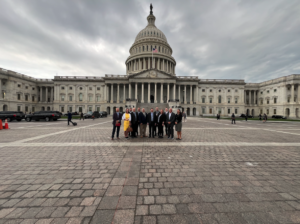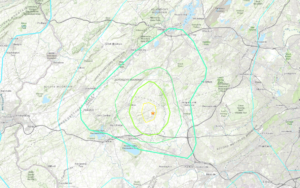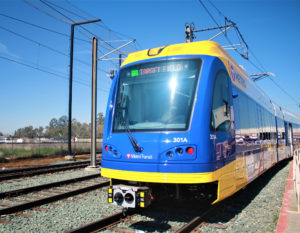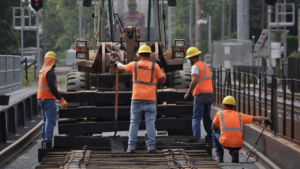Some Heartland Corridor work moving as planned
Written by jroodPatrick Donovan started talking about Prichard, W.Va., a long time ago, he said, according to The Herald-Dispatch in Huntington, W. Va. He foresaw a center of activity for transporting goods, a place where trains carrying double-stacked containers could drop off goods and where barges along the Big Sandy River, planes from Tri-State Airport and trucks along the Tolsia Highway could pick them up. He wanted it to be a stop along the planned Heartland Corridor -- a project that involves improvements in Norfolk-Southern railways between the Virginia coast and Columbus, Ohio, so trains can carry more goods in a more direct route. When finished, 28 tunnels will be raised so that trains can carry double-stacked containers. The public-private partnership also will include construction of three intermodal facilities for easier transfer of containers between rail, roadways, rivers and airways -- at Prichard, as well as Roanoke, Va., and Columbus. While efforts to raise tunnels along the Heartland Corridor Project are moving right along, it's been a slow process to get preliminary work done on an intermodal facility in Prichard. The West Virginia Public Port Authority went through a lengthy process to hire an engineering firm to do an environmental study on the land along the Big Sandy River, where it will sit. The study determines if the project is compliant with the National Environmental Protection Act. It looks at archaeological and flood concerns, stream restorations and wetland issues. Baker Engineering of Cross Lanes was hired in February for that project, and while the results of the study are promising, Donovan said, the Port Authority still awaits approval from the West Virginia Historic Preservation Office. When it finally becomes a reality, it is expected to be an economic boon for the entire region, as companies set up warehouses and other related businesses along the route, said Donovan and Don Perdue, executive director of Wayne County Economic Development Authority. While the Port Authority, as well as local government and Norfolk Southern await that approval for the environmental study, they're also waiting for news about a new grant for which they've applied. They teamed up to apply for $50 million in federal stimulus funding. Nationally, $1.5 billion is up for grabs through the Transportation Investment Generating Economic Recovery (TIGER) Discretionary Grants Program. If approved, $30 million in TIGER funds would go toward the Prichard intermodal facility, and $20 million would go toward the tunnel work. Donovan said he's encouraged by what's in the outline describing projects that would qualify for the grant money. Receiving those funds would free up more upfront money for the project. As of now, Senate Bill 569, approved by the General Assembly in 2007, provides $4.3 million per fiscal year through 2016 for the Heartland Corridor. The first fiscal year, $2.15 million was allotted, but the following years, the full $4.3 million will be provided. Norfolk Southern has already put $49.5 million of its own money into the tunnel clearance project, with a $90 million match in federal funds. The tunnel clearance project is estimated at $151 million, Norfolk Southern says. Norfolk Southern has donated 78 acres to the West Virginia Public Port Authority for the intermodal facility at Prichard, and the authority already has 20-plus acres. The railroad company would take care of hiring a company to design the facility, and it's undetermined right now who would operate it. Norfolk-Southern might contract out an operator, but would be involved in selection of the operator either way, Donovan said. "Ideally, by late spring or early summer, I want to have some dirt moving. I really do," he said. Meanwhile, all kinds of earth is moving as workers continue to heighten tunnels along the railway. "We're currently working on the last five tunnels," said Robin Chapman, spokesman for Norfolk-Southern. "One of them is called the Cooper Tunnel, not far from Bluefield. The other four are from Williamson and west of there on the Big Sandy River. We anticipate finishing in mid 2010." Workers increase the clearance for double-stacked trains by either lowering the track, when possible, or carving away rock in the tunnel. In preparation for the work, crews test drill into the rock to determine the density they're dealing with, and make sure there are no voids behind it. Then they install rock bolts to stabilize the roof. Meanwhile, trains need passage, so crews usually begin work in the wee hours of the morning so they can remove rock and spray a layer of concrete over the work area as a sealant before trains come through in the afternoon. As Prichard and southwestern West Virginia get ready for Norfolk Southern Corp.'s double-stacked trains to move through, the eastern part of the state is looking forward to a project by CSX Transportation. The rail company also is planning to embark on a project to raise tunnels to accommodate double-stack trains through the Mid-Atlantic region. The $842-million National Gateway project would affect Ohio, Pennsylvania, Maryland, Virginia and West Virginia, and is intended to reduce greenhouse gas emissions from trucks on the highway, as well as saving $3.5 billion in shipper and logistics costs, significantly increase freight capacity, reduce transit times between West Coast ports and major population and triple the market access potential for some ports on the East Coast. There's a prediction that freight transportation is going to increase by 70 percent over the next 20 years, said CSXT spokesman Bob Sullivan. Moving it to rail rather than trucks will reduce greenhouse emissions, he said. The path of the double-stacked trains would stretch from Wilmington, N.C., up the East Coast and northeastward through the Eastern Panhandle of West Virginia, Pennsylvania and Ohio. Along the National Gateway, the nearest intermodal distribution facility to West Virginia will be in Pittsburgh. CSXT is committing $395 million to the National Gateway project, and it's asking for $258 million in federal stimulus grants through the TIGER Discretionary Grants Program. States are being asked for $250 million. About $60 million will be spent in West Virginia, to clear six tunnels in the state. But West Virginia is being asked to contribute $5 million to the project, Sullivan said.





